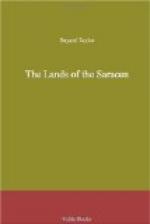While searching for the antiquities about Tarsus, I accosted a man in a Frank dress, who proved to be the Neapolitan Consul. He told us that the most remarkable relic was the Duniktash (the Round Stone), and procured us a guide. It lies in a garden near the city, and is certainly one of the most remarkable monuments in the East. It consists of a square inclosure of solid masonry, 350 feet long by 150 feet wide, the walls of which are eighteen feet in thickness and twenty feet high. It appears to have been originally a solid mass, without entrance, but a passage has been broken in one place, and in another there is a split or fissure, evidently produced by an earthquake. The material is rough stone, brick and mortar. Inside of the inclosure are two detached square masses of masonry, of equal height, and probably eighty feet on a side, without opening of any kind. One of them has been pierced at the bottom, a steep passage leading to a pit or well, but the sides of the passage thus broken indicate that the whole structure is one solid mass. It is generally supposed that they were intended as tombs: but of whom? There is no sign by which they may be recognized, and, what is more singular, no tradition concerning them.
The day we reached Tarsus was the first of the Turkish fast-month of Ramazan, the inhabitants having seen the new moon the night before. At Adana, where they did not keep such a close look-out, the fast had not commenced. During its continuance, which is from twenty-eight to twenty-nine days, no Mussulman dares eat, drink, or smoke, from an hour before sunrise till half an hour after sunset. The Mohammedan months are lunar, and each month makes the whole round of the seasons, once in thirty-three years. When, therefore, the Ramazan comes in midsummer, as at present, the fulfilment of this fast is a great trial, even to the strongest and most devout. Eighteen hours without meat or drink, and what is still worse to a genuine Turk, without a pipe, is a rigid test of faith. The rich do the best they can to avoid it, by feasting all night and sleeping all day, but the poor, who must perform their daily avocations, as usual, suffer exceedingly. In walking through Tarsus I saw many wretched faces in the bazaars, and the guide who accompanied us had a painfully famished air. Fortunately the Koran expressly permits invalids, children, and travellers to disregard the fast, so that although we eat and drink when we like, we are none the less looked upon as good Mussulmans. About dark a gun is fired and a rocket sent up from the mosque, announcing the termination of the day’s fast. The meals are already prepared, the pipes filled, the coffee smokes in the finjans, and the echoes have not died away nor the last sparks of the rocket become extinct, before half the inhabitants are satisfying their hunger, thirst and smoke-lust.
We left Tarsus this morning, and are now encamped among the pines of Mount Taurus. The last flush of sunset is fading from his eternal snows, and I drop my pen to enjoy the silence of twilight in this mountain solitude.




